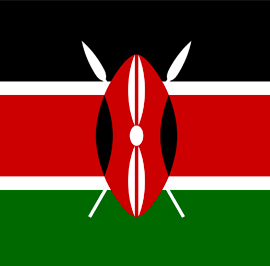
Kenya
Year Joined: 2011 | Membership: Full Member
Achieving the UHC agenda.
Kenya’s universal health coverage agenda is: “By 2020, it is envisaged that all persons in Kenya will have access to the essential services they need for their health and well-being through an explicit essential benefit package, without the risk of financial catastrophe as a result.”
Summary of UHC Journey
In 2017, the Government of Kenya identified and committed to implementing the UHC agenda, with the following main objectives:
- Progressively increase population coverage for essential health services
- Increase the percentage covered under prepaid health financing mechanisms
- Progressively expand the scope of the health benefit package
- Improve the quality of health services
- Protect from catastrophic health expenditures, especially the poor and the vulnerable
- Provide and retain health resources appropriate for the delivery of health services
- Strengthen leadership and governance within the health sector
Phased UHC implementation launched in December 2018, initially focusing on four pilot counties that would provide key lessons to inform scale-up to the rest of the country. The country continues to implement existing programs toward UHC, like the free maternity services program (Linda Mama); removal of user fees at primary care facilities; the Health Insurance Subsidy Programme and the Medical Scheme for the Elderly and People with Severe Disabilities; and the Managed Equipment Service Programme in which 98 hospitals have modern equipment bringing specialized services closer to the populations.
The National Hospital Insurance Fund is the main health insurance provider covering both the formal and informal sectors. According to the Household Utilisation and Expenditure Survey conducted in 2017, approximately 19.1% of Kenyans have some form of health insurance and about 1 million fall into poverty annually due to catastrophic health expenditures. This data has helped drive Kenya to embark toward an ambitious UHC program.

Dr. Isabel Maina
Member of the UHC coordination department and Head of Health financing division

Esther Wabuge
Kenya is one of the founding members of JLN and participated in the first workshop in Mombasa, Kenya, in June 2011. The workshop focused on sharing creative approaches and best practices for expanding coverage. After the workshop, Kenya became a full member of the JLN.
Since joining, representatives from Kenya have participated in the Leveraging Resources for Efficiency, Fiscal Policy for Public Health, PHC Financing and Payment, and Domestic Resource Mobilization collaboratives and the Information Technology and Quality initiatives.
Delegates from Kenya have contributed to the following knowledge products:
- Open Health Data Dictionary
- Software Comparison Tool
- Connecting Health Information Systems for Better Health
- Determining Common Requirements for National Health Insurance Information Systems
- Toolkit for Medical Audit Systems: Practical Advice from Implementers to Implementers
- Measurement for Improving Primary Health care toolkit
- Financing and Payment Models for Primary Health Care: Six Lessons from JLN Country Experience
- Compendium: 12 country approaches to covering poor and informal populations to achieve UHC
- Engaging the Private Sector in Primary Health Care to Achieve Universal Health Coverage: Advice from Implementers to Implementers.
- Designing Health Benefits Policies: Lessons from Six JLN Countries
- Kenya: Approaches to covering poor, vulnerable, and informal populations to achieve UHC
- Workshop on “Equity in Universal Health Coverage: How to Reach the Poorest”
- JLN Population Coverage Technical Initiative Workshop Summary
- JLN IT Initiative at AeHIN Conference in Bali.
In addition, Kenya shared best practices with Mali around mobile-based payment mechanisms and collaborated with Ghana’s National Health Insurance Scheme to develop a common e-claims form.
In 2018, Kenya focused on adapting JLN knowledge products in the country as one of its three priorities. Three tools were identified for adoption:
- The UHC-PHC Self-assessment Tool
- Costing of Health Services for Provider Payment: A Practical Manual
- Toolkit for Medical Audit Systems: Practical Advice from Implementers to Implementers
The process began by sharing these tools with the Ministry of Health and including them on the list of documents launched at the Kenya Health Forum 2018 for use in the health sector. Due to funding limitations, the UHC-PHC Self-Assessment Tool and the Costing Tool were piloted in four counties, three of which are part of the pilot UHC program in Kenya. This process was supported through the Joint Learning Fund with contributions from the participating counties. The Kenyan delegation hopes to roll this out on a larger scale taking into account the lessons learned from the pilot. Other JLN products have provided information and lessons that have contributed to the development of Kenya’s UHC agenda through contributions of the Country Core Group members in various UHC forums and committees.
